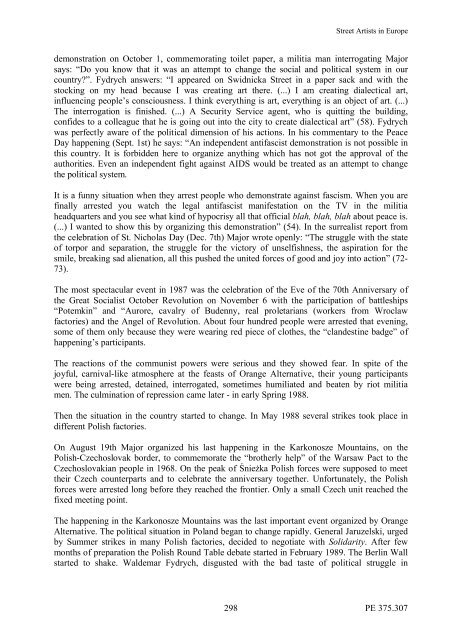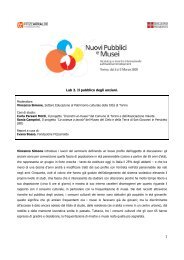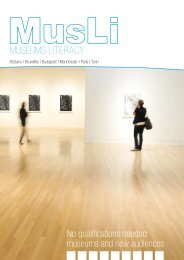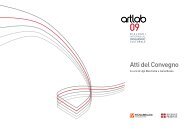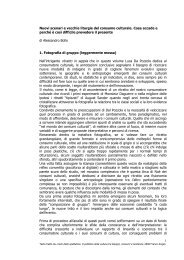- Page 1 and 2:
Policy Department Structural and Co
- Page 3 and 4:
This study was requested by the Eur
- Page 6 and 7:
Content Executive Summary iii Stree
- Page 8 and 9:
Street Artists in Europe recognize
- Page 10 and 11:
Street Artists in Europe This secto
- Page 12 and 13:
• Favouring the professionalisati
- Page 14 and 15:
Street Artists in Europe the social
- Page 16 and 17:
Table of Contents xiii Street Artis
- Page 18 and 19:
Street Artists in Europe 4.3. Train
- Page 20 and 21:
Street Artists in Europe Annex 2 -
- Page 22 and 23:
INTRODUCTION 1 Street Artists in Eu
- Page 24 and 25:
1.1. Background CHAPTER 1: WHAT ARE
- Page 26 and 27:
1.3.1. An ethic linked to the uses
- Page 28 and 29:
Street Artists in Europe • The he
- Page 30 and 31:
2.1. Background CHAPTER 2: WHAT IS
- Page 32 and 33:
Street Artists in Europe number inc
- Page 34 and 35:
2.4. Tools 2.4.1. Mobility 13 Stree
- Page 36 and 37:
2.4.2.3 Language and communication
- Page 38 and 39:
17 Street Artists in Europe perform
- Page 40 and 41:
Street Artists in Europe CHAPTER 3:
- Page 42 and 43:
Street Artists in Europe Street art
- Page 44 and 45:
Street Artists in Europe activities
- Page 46 and 47:
Street Artists in Europe The first
- Page 48 and 49:
4.1. Background CHAPTER 4: STREET A
- Page 50 and 51:
Street Artists in Europe culture wa
- Page 52 and 53:
Street Artists in Europe frequent r
- Page 54 and 55:
33 Street Artists in Europe the sus
- Page 56 and 57:
5.1. Background CHAPTER 5: STREET A
- Page 58 and 59:
Street Artists in Europe usually di
- Page 60 and 61:
5.3.3. Mixed audience 5.3.3.1. Stre
- Page 62 and 63:
Street Artists in Europe the viewpo
- Page 64 and 65:
6.1. Background 43 Street Artists i
- Page 66 and 67:
Street Artists in Europe local fest
- Page 68 and 69:
• Small scale (audience of up to
- Page 70 and 71:
6.4.3. Budgets 49 Street Artists in
- Page 72 and 73:
Street Artists in Europe companies
- Page 74 and 75:
Street Artists in Europe badly unde
- Page 76 and 77:
Street Artists in Europe CHAPTER 7:
- Page 78 and 79:
Street Artists in Europe support fo
- Page 80 and 81:
Street Artists in Europe law, cover
- Page 82 and 83:
Books BIBLIOGRAPHY 61 Street Artist
- Page 84 and 85:
Articles and special issues 63 Stre
- Page 86 and 87:
Street Artists in Europe Goh, F., I
- Page 88 and 89:
Street Artists in Europe www.straat
- Page 90 and 91:
ANNEX 1: METHODOLOGICAL APPROACH 1.
- Page 92 and 93:
Street Artists in Europe • Establ
- Page 94 and 95:
Street Artists in Europe • The in
- Page 96 and 97:
1.3.3. Institutional and intellectu
- Page 98 and 99:
Street Artists in Europe promoters
- Page 100 and 101:
Total of 119 filled questionnaires
- Page 102 and 103:
ANNEX 2 - SECTION A: THE AESTHETICS
- Page 104 and 105:
Street Artists in Europe public spa
- Page 106 and 107:
Street Artists in Europe performanc
- Page 108 and 109:
Street Artists in Europe And that i
- Page 110 and 111:
5.1. Interdisciplinary nature 89 St
- Page 112 and 113:
The heritage of fairground theatre
- Page 114 and 115:
Street Artists in Europe ‘The tem
- Page 116 and 117:
Street Artists in Europe 5.3.2.5. T
- Page 118 and 119:
Statistics of disciplines used in s
- Page 120 and 121:
Mime 193 16 8.29 99 Street Artists
- Page 122 and 123:
ANNEX 2 - SECTION B: WHAT IS A STRE
- Page 124 and 125:
Street Artists in Europe interferen
- Page 126 and 127:
Street Artists in Europe into accou
- Page 128 and 129:
Street Artists in Europe • democr
- Page 130 and 131:
Street Artists in Europe described
- Page 132 and 133:
Street Artists in Europe • person
- Page 134 and 135:
Street Artists in Europe Isabelle D
- Page 136 and 137:
ANNEX 2 - SECTION C: POLITICAL AND
- Page 138 and 139:
Street Artists in Europe policies i
- Page 140 and 141:
Street Artists in Europe Any study
- Page 142 and 143:
Street Artists in Europe increase,
- Page 144 and 145:
Street Artists in Europe profession
- Page 146 and 147:
Street Artists in Europe sought to
- Page 148 and 149:
Street Artists in Europe The region
- Page 150 and 151:
Street Artists in Europe Irish Arts
- Page 152 and 153:
Street Artists in Europe produced i
- Page 154 and 155:
Street Artists in Europe Since then
- Page 156 and 157:
135 Street Artists in Europe • fo
- Page 158 and 159:
Street Artists in Europe with inter
- Page 160 and 161:
technical support and promoting com
- Page 162 and 163:
Street Artists in Europe contributi
- Page 164 and 165:
3.2.6. Croatia 143 Street Artists i
- Page 166 and 167:
Street Artists in Europe ANNEX 2 -
- Page 168 and 169:
Street Artists in Europe Christiani
- Page 170 and 171:
Street Artists in Europe Protestant
- Page 172 and 173:
Street Artists in Europe 44) who mo
- Page 174 and 175:
153 Street Artists in Europe Munich
- Page 176 and 177:
Street Artists in Europe 5. Contemp
- Page 178 and 179:
Street Artists in Europe The street
- Page 180 and 181:
Street Artists in Europe Hopking in
- Page 182 and 183:
Street/fringe theatre in Europe aga
- Page 184 and 185:
Street Artists in Europe Daska, Sis
- Page 186 and 187:
Street Artists in Europe or in some
- Page 188 and 189:
Street Artists in Europe unique pro
- Page 190 and 191:
Poland 169 Street Artists in Europe
- Page 192 and 193:
Street Artists in Europe audience.
- Page 194 and 195:
ANNEX 2 - SECTION E: STREET ARTS AN
- Page 196 and 197:
Street Artists in Europe Gathering
- Page 198 and 199:
Street Artists in Europe long term
- Page 200 and 201:
Street Artists in Europe developmen
- Page 202 and 203:
Street Artists in Europe between th
- Page 204 and 205:
Street Artists in Europe long proce
- Page 206 and 207:
Street Artists in Europe Permission
- Page 208 and 209:
187 Street Artists in Europe they o
- Page 210 and 211:
3.2.1. The type of location Table 3
- Page 212 and 213:
191 Street Artists in Europe An una
- Page 214 and 215:
Table 6 - Cooperations and partners
- Page 216 and 217:
195 Street Artists in Europe ‘Reg
- Page 218 and 219:
Street Artists in Europe where the
- Page 220 and 221:
4.4. Economic effects Table 10 - Ec
- Page 222 and 223:
Table 12 - Sustainability in the ci
- Page 224 and 225:
6. Conclusion 203 Street Artists in
- Page 226 and 227:
ANNEX 2 - SECTION F: STREET ARTS AU
- Page 228 and 229:
207 Street Artists in Europe now kn
- Page 230 and 231:
Street Artists in Europe ‘Festiva
- Page 232 and 233:
3.1. Impact of occupying the public
- Page 234 and 235:
Street Artists in Europe for friend
- Page 236 and 237:
Street Artists in Europe As we have
- Page 238 and 239:
Street Artists in Europe However, i
- Page 240 and 241:
Street Artists in Europe who say th
- Page 242 and 243:
4.1.2. Duration of presence and loc
- Page 244 and 245:
Street Artists in Europe discover p
- Page 246 and 247:
ANNEX 2 - SECTION G: STREET ARTS IN
- Page 248 and 249:
Street Artists in Europe (c) new pe
- Page 250 and 251:
Street Artists in Europe Aurillac a
- Page 252 and 253:
3. The funding opportunities availa
- Page 254 and 255:
Street Artists in Europe ‘Ireland
- Page 256 and 257:
Street Artists in Europe These netw
- Page 258 and 259:
‘….And also there free lance me
- Page 260 and 261:
Street Artists in Europe ways to fo
- Page 262 and 263:
Street Artists in Europe Creation c
- Page 264 and 265:
Street Artists in Europe culture an
- Page 266 and 267:
6.1. Language problems These do app
- Page 268 and 269: 7.2. Communications and networks 24
- Page 270 and 271: ANNEX 2 - SECTION H: STREET ARTS IN
- Page 272 and 273: Street Artists in Europe respondent
- Page 274 and 275: 2. Difficulties and limitations at
- Page 276 and 277: Street Artists in Europe Artists fr
- Page 278 and 279: Street Artists in Europe "… lack
- Page 280 and 281: Street Artists in Europe informatio
- Page 282 and 283: Street Artists in Europe festival u
- Page 284 and 285: Street Artists in Europe Respondent
- Page 286 and 287: Street Artists in Europe ANNEX 2 -
- Page 288 and 289: 1.1.2. Alternatives to public funds
- Page 290 and 291: In fact, researches recommend to fo
- Page 292 and 293: Street Artists in Europe health pro
- Page 294 and 295: Street Artists in Europe accelerate
- Page 296 and 297: Street Artists in Europe “Western
- Page 298 and 299: Street Artists in Europe easier to
- Page 300 and 301: Street Artists in Europe In France,
- Page 302 and 303: Street Artists in Europe important
- Page 304 and 305: Street Artists in Europe Of course,
- Page 306 and 307: 285 Street Artists in Europe Synthe
- Page 308 and 309: Street Artists in Europe Synthesis
- Page 310 and 311: ANNEX 2 - SECTION J: STREET ARTS IN
- Page 312 and 313: Street Artists in Europe This space
- Page 314 and 315: Street Artists in Europe to express
- Page 316 and 317: Street Artists in Europe Store” 4
- Page 320 and 321: 299 Street Artists in Europe democr
- Page 322 and 323: Street Artists in Europe rules of t
- Page 324 and 325: Street Artists in Europe This diffe
- Page 326 and 327: Street Artists in Europe Out of the
- Page 328 and 329: Street Artists in Europe only rebel
- Page 330 and 331: Street Artists in Europe example, t


